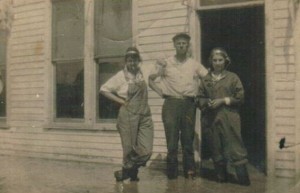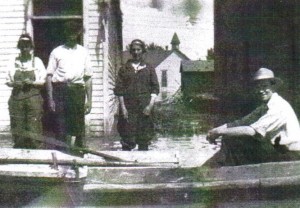operator
 After my husband, Bob’s 2nd great grandma, Mary LuLu Taylor remarried, following the death of her first husband, James Leary, on March 26, 1888, she and her second husband had three children, bringing to four the total number of her children. Her life had taken her from Forsyth, Montana to Shelby, Missouri, where she met James Begier, who became her second husband. Later, they would move to several other times, but Montana always seemed to be in her blood and she would return there several times. Her daughter Mabel Claire Begier met and married her husband, Edward Anthony Brown in Rosebud, Montana. I’m not positive at what point Mabel became a telephone operator, but she did, and as it turns out, that’s where she was working during one of the floods that took place in Montana. That job, at that time in history, put her right in the middle of a serious situation, and in a position to help those in need of assistance.
After my husband, Bob’s 2nd great grandma, Mary LuLu Taylor remarried, following the death of her first husband, James Leary, on March 26, 1888, she and her second husband had three children, bringing to four the total number of her children. Her life had taken her from Forsyth, Montana to Shelby, Missouri, where she met James Begier, who became her second husband. Later, they would move to several other times, but Montana always seemed to be in her blood and she would return there several times. Her daughter Mabel Claire Begier met and married her husband, Edward Anthony Brown in Rosebud, Montana. I’m not positive at what point Mabel became a telephone operator, but she did, and as it turns out, that’s where she was working during one of the floods that took place in Montana. That job, at that time in history, put her right in the middle of a serious situation, and in a position to help those in need of assistance.
When we think of any disaster…be it fire, earthquake, tornado, or flood, our first instinct these days is to dial 911 on our phones. That has become the go to number for all kinds of help in times of need. That wasn’t always the case though. Years ago, it was the operator you called for help. You simply dialed “0” to get in touch with someone who could connect you with any branch of emergency help there was…as well as to let everyone else in town know about the emergency…at least back then they could. Privacy laws would have prevented that these days. Of course, if it was a big emergency, letting everyone know would be her job.
 Mabel Begier was an operator during an emergency that would have qualified as one in which it was acceptable to let people know, but then my guess is that most people already knew that it was coming. Floods in towns where you live near a river are common in the Spring, especially after a particularly high snowfall year. People who live near rivers already know that Spring means that you have to watch the water levels, stay prepared to evacuate, and stay informed at all times. At that time in history, when a warning needed to be sent out, you called the operator to get the warning out. That was where Mabel came in, and she loved her job. I think the job that she had was very important, and she was a key part of the emergency efforts of that era.
Mabel Begier was an operator during an emergency that would have qualified as one in which it was acceptable to let people know, but then my guess is that most people already knew that it was coming. Floods in towns where you live near a river are common in the Spring, especially after a particularly high snowfall year. People who live near rivers already know that Spring means that you have to watch the water levels, stay prepared to evacuate, and stay informed at all times. At that time in history, when a warning needed to be sent out, you called the operator to get the warning out. That was where Mabel came in, and she loved her job. I think the job that she had was very important, and she was a key part of the emergency efforts of that era.

